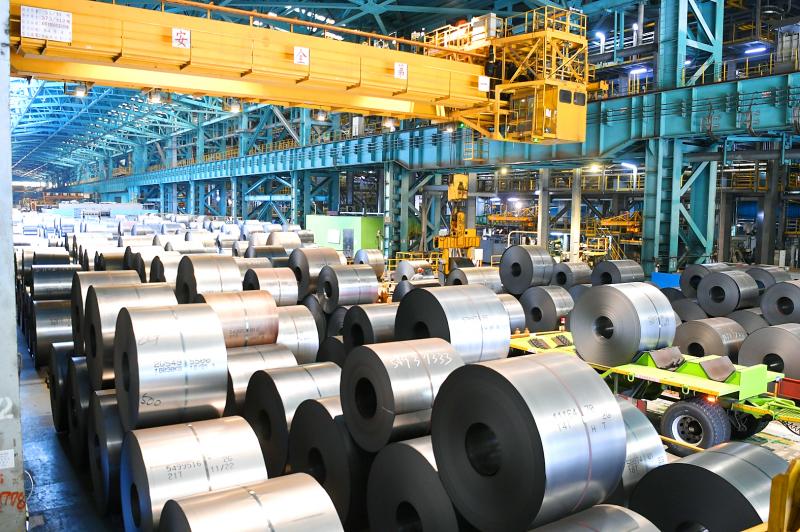The industrial production index last month climbed to a new high as demand for chips used in 5G, high-performance computing and emerging technologies boosted manufacturing, the Ministry of Economic Affairs said yesterday.
The manufacturing production index, a major contributor to the nation’s industrial production, rose 10.57 percent last month from a year earlier, surpassing the ministry’s estimate of annual expansion of 7.3 percent to 9.4 percent.
The ministry attributed the performance to an improvement in supply constraints of key components and raw materials.

Photo courtesy of China Steel Corp
The industrial production index and manufacturing index last year jumped 13.22 percent and 14.06 percent respectively, the most in about a decade, data showed.
“The manufacturing sector benefited from the global economic recovery last year. Among them, the semiconductor industry showed outstanding performance for the year,” Department of Statistics Deputy Director-General Huang Wei-jie (黃偉傑) said.
The ministry expects the current local COVID-19 outbreak to have a minor impact on the production of electronics, as well as the information and communications technology segments, if the factory shutdown in Taoyuan’s Farglory Free Trade Zone (遠雄自由貿易港區) is limited to two weeks, Huang said.
The ministry also expects the manufacturing sector’s momentum to withstand an expected slow season starting this month, predicting that production could dip 2.9 percent to 5.7 percent from last month, a slower decline than an average slump of 6.9 percent, Huang said.
That would represent annual growth of 7.6 percent to 10.8 percent, he said.
Last month, the production of electronic components, the largest segment in the manufacturing index, rose 19.87 percent year-on-year and 5.49 percent month-on-month, the ministry’s statistics showed.
The semiconductor sub-index soared 25.79 percent year-on-year and 9.6 percent month-on-month.
The production of vehicles and automotive components last month declined 9.32 percent annually due to chip and component shortages, although it represented a monthly increase of 3.54 percent.
The production of petrochemicals contracted 2.2 percent annually and 1.44 percent monthly; base metals dropped 1.75 percent annually, but rose 0.09 percent monthly; and the machinery segment output grew 5.38 percent annually and 3.76 percent monthly.
Separately, retail sales rose 3.7 percent annually to NT$368.4 billion (US$13.3 billion) last month, dragged by an annual slump of 8 percent in car and two-wheel vehicle sales. Fuel sales jumped the most by 21.7 percent year-on-year due to price hikes last month, the ministry said.
Promotions launched by department stores helped boost sales of versatile goods to an annual growth of 6 percent last month, it said.
Retail sales last year rose 3.3 percent to NT$3.99 trillion, with online sales surging 24.5 percent annually to NT$430.3 billion.
Restaurant sales expanded 7.1 percent year-on-year to NT$77 billion last month, attributable to the Christmas holiday and the effect of government-backed stimulus vouchers, the ministry said.
Last year, restaurant sales fell 6.4 percent to NT$728 billion, marking the second consecutive year declines, and the steepest drop since 2002.
The ministry expects restaurant business to rise 8.5 percent to 11.5 percent annually this month.
Wholesale revenue rose 12.1 percent last month to NT$1.11 trillion from a year earlier, with machinery revenue growing 22.5 percent to NT$492.1 billion on strong demand for semiconductor components and price hikes, while construction material sales climbed 13.4 percent to NT$127.8 billion due to local manufacturers’ factory expansions and higher steel prices.
Last year, wholesale revenue expanded 15.8 percent from 2020 to NT$1.22 trillion, with machinery revenue soaring 42.6 percent annually, the ministry said.

To many, Tatu City on the outskirts of Nairobi looks like a success. The first city entirely built by a private company to be operational in east Africa, with about 25,000 people living and working there, it accounts for about two-thirds of all foreign investment in Kenya. Its low-tax status has attracted more than 100 businesses including Heineken, coffee brand Dormans, and the biggest call-center and cold-chain transport firms in the region. However, to some local politicians, Tatu City has looked more like a target for extortion. A parade of governors have demanded land worth millions of dollars in exchange

An Indonesian animated movie is smashing regional box office records and could be set for wider success as it prepares to open beyond the Southeast Asian archipelago’s silver screens. Jumbo — a film based on the adventures of main character, Don, a large orphaned Indonesian boy facing bullying at school — last month became the highest-grossing Southeast Asian animated film, raking in more than US$8 million. Released at the end of March to coincide with the Eid holidays after the Islamic fasting month of Ramadan, the movie has hit 8 million ticket sales, the third-highest in Indonesian cinema history, Film

Taiwan Semiconductor Manufacturing Co’s (TSMC, 台積電) revenue jumped 48 percent last month, underscoring how electronics firms scrambled to acquire essential components before global tariffs took effect. The main chipmaker for Apple Inc and Nvidia Corp reported monthly sales of NT$349.6 billion (US$11.6 billion). That compares with the average analysts’ estimate for a 38 percent rise in second-quarter revenue. US President Donald Trump’s trade war is prompting economists to retool GDP forecasts worldwide, casting doubt over the outlook for everything from iPhone demand to computing and datacenter construction. However, TSMC — a barometer for global tech spending given its central role in the

Alchip Technologies Ltd (世芯), an application-specific integrated circuit (ASIC) designer specializing in server chips, expects revenue to decline this year due to sagging demand for 5-nanometer artificial intelligence (AI) chips from a North America-based major customer, a company executive said yesterday. That would be the first contraction in revenue for Alchip as it has been enjoying strong revenue growth over the past few years, benefiting from cloud-service providers’ moves to reduce dependence on Nvidia Corp’s expensive AI chips by building their own AI accelerator by outsourcing chip design. The 5-nanometer chip was supposed to be a new growth engine as the lifecycle